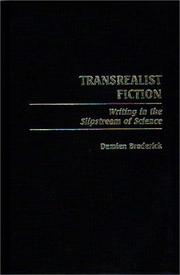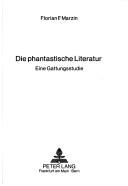| Listing 1 - 10 of 18 | << page >> |
Sort by
|
Multi
ISBN: 9781400870790 9780691607443 1400870798 9780691063010 9780691013404 0691607443 Year: 1976 Publisher: Princeton, New Jersey : Princeton University Press,
Abstract | Keywords | Export | Availability | Bookmark
 Loading...
Loading...Choose an application
- Reference Manager
- EndNote
- RefWorks (Direct export to RefWorks)
What exactly is the fantastic? In the twentieth-century world, our notions of what is impossible are assaulted every day. To define the nature of fantasy and the fantastic, Eric S. Rabkin considers its role in fairy tales, science fiction, detective stories, and religious allegory, as well as in traditional literature. The examples he studies range from Grimm's fairy tales to Agatha Christie, from Childhood's End to the novels of Henry James, from Voltaire to Robbe-Grillet to A Canticle for Leiboivitz. By analyzing different works of literature, the author shows that the fantastic depends on a reversal of the ground rules of a narrative world. This reversal signals most commonly a psychological escape, often from boredom, to an unknown world secretly yearned for, whose order, although reversed, bears a precise relation to reality.Originally published in 1976.The Princeton Legacy Library uses the latest print-on-demand technology to again make available previously out-of-print books from the distinguished backlist of Princeton University Press. These editions preserve the original texts of these important books while presenting them in durable paperback and hardcover editions. The goal of the Princeton Legacy Library is to vastly increase access to the rich scholarly heritage found in the thousands of books published by Princeton University Press since its founding in 1905.
Literature --- Fantasy literature --- Fantastic, The, in literature. --- Literary criticism --- History and criticism. --- General.
Book
ISBN: 2842872762 9782842872762 Year: 2003 Publisher: Limoges: PULIM,
Abstract | Keywords | Export | Availability | Bookmark
 Loading...
Loading...Choose an application
- Reference Manager
- EndNote
- RefWorks (Direct export to RefWorks)
Literature --- Fantasy literature --- Mythology in literature --- Littérature fantastique --- Mythologie dans la littérature --- Dictionaries --- French --- Dictionnaires français --- Littérature fantastique --- Mythologie dans la littérature --- Dictionnaires français --- Fantastic, The, in literature --- Fantasy literature - Encyclopedias. --- Fantastic, The, in literature - Encyclopedias.
Book
ISBN: 204018502X 9782040185022 Year: 1994 Volume: 36 Publisher: Paris: Bordas,
Abstract | Keywords | Export | Availability | Bookmark
 Loading...
Loading...Choose an application
- Reference Manager
- EndNote
- RefWorks (Direct export to RefWorks)
Comparative literature --- Thematology --- Literature: authors --- Littérature fantastique --- Histoire et critique --- Guides, manuels, etc --- Fantasy literature --- Fantastic, The, in the arts --- Encyclopedias --- Littérature fantastique --- Dictionaries --- Fantasy literature - Encyclopedias --- Fantastic, The, in the arts - Encyclopedias

ISBN: 0313311218 0313003165 9780313003165 9780313311215 9798216027324 Year: 2000 Publisher: Westport, Conn. : London : Praeger, Bloomsbury Publishing,
Abstract | Keywords | Export | Availability | Bookmark
 Loading...
Loading...Choose an application
- Reference Manager
- EndNote
- RefWorks (Direct export to RefWorks)
Fiction --- Thematology --- Science fiction --- Fantastic, The, in literature. --- Realism in literature. --- Reality in literature. --- Neorealism (Literature) --- Magic realism (Literature) --- Mimesis in literature --- Fantastic, The (Aesthetics), in literature --- Science --- Science stories --- Future, The, in literature --- History and criticism --- Theory, etc. --- Authorship.
Book
ISBN: 9789004450288 9789004450271 Year: 2021 Publisher: Leiden;Boston Brill | Rodopi
Abstract | Keywords | Export | Availability | Bookmark
 Loading...
Loading...Choose an application
- Reference Manager
- EndNote
- RefWorks (Direct export to RefWorks)
"Le nouveau fantastique de Jean-Pierre Andrevon analyse les facettes étranges du fantastique de Jean-Pierre Andrevon, écrivain contemporain appelé le " King " ou " Lovecraft " français. Andrevon propose une nouvelle vision du fantastique ancré profondément dans le quotidien contemporain, en apparence monotone et banal, dans lequel évoluent aussi bien ses personnages que ses lecteurs. L'auteur révèle ainsi le revers angoissant du monde, qui devient une source d'horreur puissante car familière au lecteur : catastrophes naturelles (pandémies mystérieuses, désastres climatiques, fin de l'Anthropocène) et historiques (guerres, totalitarismes), problèmes sociaux et psychologiques (folie, psychoses collectives, solitude). Un signe emblématique du fantastique andrevonien est également son dialogue avec le cinéma d'horreur. English summary: Le nouveau fantastique de Jean-Pierre Andrevon analyses the uncanny facets of the fantastic by Jean-Pierre Andrevon, a contemporary writer called "the French Stephen King" or "the French H.P. Lovecraft". Andrevon presents a new vision of the fantastic, deeply rooted in contemporary everyday life, seemingly monotonous and banal, in which both his characters and his readers evolve. Thus, the author reveals a different, harrowing side of the world familiar to the reader, as it turns into a powerful source of horror: natural catastrophes (mysterious pandemics, climate-related disasters, end of the Anthropocene), historical tragedies (wars, totalitarianism), social and psychological problems (madness, collective psychosis, loneliness). Another hallmark of Andrevonian fantastic is its dialogue with horror cinema"--
Book
ISBN: 069106301X 0691013403 0691607443 1400870798 9781400870790 9780691607443 9780691063010 9780691013404 Year: 1977 Publisher: Princeton (N.J.) : Princeton university press,
Abstract | Keywords | Export | Availability | Bookmark
 Loading...
Loading...Choose an application
- Reference Manager
- EndNote
- RefWorks (Direct export to RefWorks)
What exactly is the fantastic? In the twentieth-century world, our notions of what is impossible are assaulted every day. To define the nature of fantasy and the fantastic, Eric S. Rabkin considers its role in fairy tales, science fiction, detective stories, and religious allegory, as well as in traditional literature. The examples he studies range from Grimm's fairy tales to Agatha Christie, from Childhood's End to the novels of Henry James, from Voltaire to Robbe-Grillet to A Canticle for Leiboivitz. By analyzing different works of literature, the author shows that the fantastic depends on a reversal of the ground rules of a narrative world. This reversal signals most commonly a psychological escape, often from boredom, to an unknown world secretly yearned for, whose order, although reversed, bears a precise relation to reality.Originally published in 1976.The Princeton Legacy Library uses the latest print-on-demand technology to again make available previously out-of-print books from the distinguished backlist of Princeton University Press. These editions preserve the original texts of these important books while presenting them in durable paperback and hardcover editions. The goal of the Princeton Legacy Library is to vastly increase access to the rich scholarly heritage found in the thousands of books published by Princeton University Press since its founding in 1905.
Littérature fantastique --- Fantastic, The, in literature. --- Fantastic, The (Aesthetics), in literature --- Fantastic, The, in literature --- -Fantastic literature --- 82-312.9 --- Fantasy literature --- 82-312.9 Fantastische literatuur --- Fantastische literatuur --- History and criticism --- History and criticism. --- Comparative literature --- Thematology --- Littérature fantastique --- Histoire et critique --- Literary criticism --- General. --- Fantasy literature - History and criticism
Book
ISBN: 9788484894674 8484894673 9783865275295 386527529X 3964566187 Year: 2009 Publisher: Madrid Iberoamericana
Abstract | Keywords | Export | Availability | Bookmark
 Loading...
Loading...Choose an application
- Reference Manager
- EndNote
- RefWorks (Direct export to RefWorks)
Fiction --- Spanish-American literature --- anno 1990-1999 --- anno 2000-2009 --- Latin American fiction --- Fantastic, The, in literature. --- Realism in literature. --- History and criticism.
Book
ISBN: 9781138824225 1138824224 9781315740829 1315740826 9781317581338 1317581334 9781317581314 9781317581321 9781138547766 Year: 2015 Publisher: New York, N.Y. Routledge
Abstract | Keywords | Export | Availability | Bookmark
 Loading...
Loading...Choose an application
- Reference Manager
- EndNote
- RefWorks (Direct export to RefWorks)
Arising from the philosophical conviction that our sense of space plays a direct role in our apprehension and construction of reality (both factual and fictional), this book investigates how conceptions of postmodern space have transformed the history of the impossible in literature. Deeply influenced by the work of Jorge Luis Borges and Julio Cortázar, there has been an unprecedented rise in the number of fantastic texts in which the impossible is bound to space - space not as scene of action but as impossible element performing a fantastic transgression within the storyworld. This book conceptualizes and contextualizes this postmodern, fantastic use of space that disrupts the reader's comfortable notion of space as objective reality in favor of the concept of space as socially mediated, constructed, and conventional. In an illustration of the transnational nature of this phenomenon, García analyzes a varied corpus of the Fantastic in the past four decades from different cultures and languages, merging literary analysis with classical questions of space related to the fields of philosophy, urban studies, and anthropology. Texts include authors such as Julio Cortázar (Argentina), John Barth (USA), J.G. Ballard (UK), Jacques Sternberg (Belgium), Fernando Iwasaki (Perú), Juan José Millás (Spain,) and Éric Faye (France). This book contributes to Literary Theory and Comparative Literature in the areas of the Fantastic, narratology, and Geocriticism and informs the continuing interdisciplinary debate on how human beings make sense of space.
space perception --- Thematology --- architecture [discipline] --- Architecture --- Space (Architecture) in literature. --- Postmodernism (Literature) --- Fantastic, The, in literature. --- Geographical perception in literature. --- BIOGRAPHY & AUTOBIOGRAPHY --- Postmodernism (Literature). --- Literary.

ISBN: 3820471561 Year: 1982 Volume: 569 Publisher: Frankfurt
Abstract | Keywords | Export | Availability | Bookmark
 Loading...
Loading...Choose an application
- Reference Manager
- EndNote
- RefWorks (Direct export to RefWorks)
Multi
ISBN: 9781107018143 9781139087421 9781107610293 Year: 2016 Publisher: Cambridge Cambridge University
Abstract | Keywords | Export | Availability | Bookmark
 Loading...
Loading...Choose an application
- Reference Manager
- EndNote
- RefWorks (Direct export to RefWorks)
Fantasy has been an important and much-loved part of children's literature for hundreds of years, yet relatively little has been written about it. Children's Fantasy Literature traces the development of the tradition of the children's fantastic - fictions specifically written for children and fictions appropriated by them - from the sixteenth to the twenty-first century, examining the work of Lewis Carroll, L. Frank Baum, C. S. Lewis, Roald Dahl, J. K. Rowling and others from across the English-speaking world. The volume considers changing views on both the nature of the child and on the appropriateness of fantasy for the child reader, the role of children's fantasy literature in helping to develop the imagination, and its complex interactions with issues of class, politics and gender. The text analyses hundreds of works of fiction, placing each in its appropriate context within the tradition of fantasy literature.
Children's literature. Juvenile literature --- jeugdliteratuur --- fantasie (verbeelding) --- Children's literature --- Fantastic, The, in literature --- Fantasy fiction --- History and criticism --- fantasy
| Listing 1 - 10 of 18 | << page >> |
Sort by
|

 Search
Search Feedback
Feedback About UniCat
About UniCat  Help
Help News
News